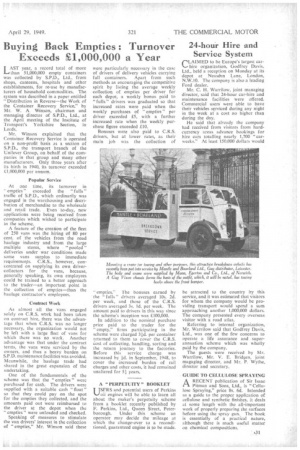Buying Back Empties : Turnover Exceeds £1,000,000 a Year
Page 7

If you've noticed an error in this article please click here to report it so we can fix it.
LAST year, a record total of more than 51,000,000 empty containers was collected by S.P.D., Ltd., from shops, canteens, hospitals and other establishments, for re-use by manufacturers of household commodities. The system was described in a paper. entitled "Distribution in Reverse—the Work of the Container Recovery Service," by Mr. W. A. Winson, chairman and managing director of S.P.D., Ltd., at the April meeting of the Institute of Transport's Yorkshire Section, in Leeds.
Mr. Winson explained that the Container Recovery Service is operated on a non-profit basis as a section of S.P.D., the transport branch of the Unilever Group, on behalf of the companies in that group and many other manufacturers. Only three years after its birth in 1940, its turnover exceeded £1,000,000 per annum.
Popular Service At one time, its turnover in empties" exceeded the "fulls" traffic of S.P.D., which ordinarily was engaged in the warehousing and distribution of merchandise to the wholesale and retail trade. Even to-day, new applications were being received from companies which wished to participate in the scheme.
A feature of the creation of the fleet of 250 vans was the hiring of 80 per cent. of the vehicles from the road haulage industry and from the large multiple stores, where "pooled" deliveries under war conditions made some vans surplus to immediate requirements. C.R,S., however, concentrated on supplying its own drivercollectors for the vans, because, generally speaking, its own employees could be trained to a better approach to the trader—an important point in the collection of empties—than the haulage contractor's employees.
Contract Work
As almost all the vans engaged solely on C.R.S. w'ork had been taken on contract hire, there was the advantage that when C.R.S. was no longer necessary, the organization would not be left with a large fleet of vans for which there was no work. Another advantage was that under the contract terms, the vans were serviced by the owners, and thus a heavy burden on S.P.D. maintenance facilities was avoided. Meanwhile, the haulage trade had shared in the great expansion of the undertaking.
One of the fundamentals of the scheme was that the " empties were purchased for cash. The drivers were supplied with a suitable cash " float " so that they could pay on the spot for the empties they collected, and the amounts paid out were reimbursed to the driver at the depot when the "empties" were unloaded and checked.
Speaking of measures to stimulate the van drivers' interest in the collection of "empties," Mr. Winson said these were particularly necessary in the case of drivers of delivery vehicles carrying full containers. Apart from such methods as encouraging the competitive spirit by listing the average weekly collection of empties per driver for each depot, a weekly bonus paid to "fulls" drivers was graduated so that increased rates were paid when the weekly purchases of "empties" per driver exceeded £5, with a further increased rate when the weekly purchase figure exceeded £10.
Bonuses were also paid to C.R.S. drivers, but at lower rates, as their main job was the collection of " empties." The bonuses earned by the "fulls" drivers averaged 10s. 2d. per week, and those of the C.R.S. drivers averaged 3s. 1d, per week. The amount paid to drivers in this way since the scheme's inception was £100,000.
In addition to the nominal purchase price paid to the trader for the empty," firms participating in the scheme were charged nd. per container returned to them to cover the C.R.S. cost of collecting, handling, sorting and the return journey to the factories. Before this service charge was increased by in September, 1948, to cover the increased burden of rail charges and other costs, it had remained unaltered for 51 years.
A " PERPETUITY " BOOKLET
USFRS and potential users of Perkins ail engines will be able to learn all about the maker's perpetuity scheme from a booklet recently published by F. Perkins, Ltd., Queen Street, Peterborough. Under this scheme an operator may decide the mileage at which the change-over to a reconditioned, guaranteed engine is to be made.


























